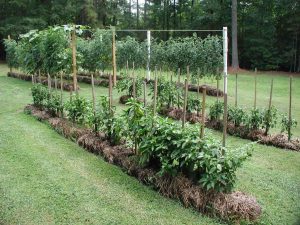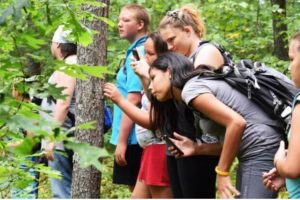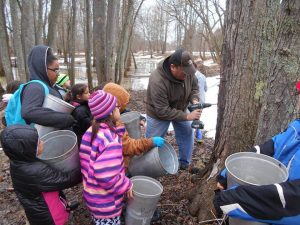The Bad River Band of Lake Superior Tribe of Chippewa Indians (Chippewa, Ojibwe, and Anishnaabe are all different names for the same cultural group) is located on a 125,000 acre reservation in Northern Wisconsin, on the south shore of Lake Superior. About 1,500 of the Tribe’s 7,000 members live on the reservation.
Activities
The area that is now the Bad River reservation was originally known as “Gete Gititaaning,” meaning “at the old garden.” While Anishnaabe people followed seasonal routes around their territory, in the spring they would plant their gardens in the rich soil of the river flood plain, and return to harvest in the fall. The University of Wisconsin FRTEP extension program’s gardening initiatives are ongoing and extensive.
Highlights
MEASURING IMPACT
-
“….gardening was probably the biggest thing. Teaching those healthy relationships with our plants, our land, and teaching… respect and love. And with all those [the agent] ties in all of our seven grandfather teachings…”
FRTEP programs have had a major impact on individuals, families and tribal communities. Just how much impact has now been quantified thanks to a research project that used Ripple Effects Mapping (REM) and content analysis. The Indian Land Tenure Foundation (ILTF) engaged in a joint collaboration with an evaluation team and the Western Extension Risk Management Education Center to measure the long-term impacts of the Federally Recognized Tribal Extension Program (FRTEP) serving the Bad River Reservation. Click the link below to read the report.
Community gardens
The Bad River Gitiganing Community Garden project was started in 2003. One project operates in an ancient gardening site. There are also home gardens, a garden at the Elder Center, and experimental gardens where permaculture methods are being tested to grow more food in the heavy clay soil. The Tribe is also working on re-educating members on how to harvest and prepare wild foods, and providing community members with some of the resources to carry this out.

The turtle-shaped garden once held mostly medicinal plants, but has been expanded to include lettuce, tomatoes, squash, cabbage, carrots, onions, beans, sunflowers, corn and other crops. Adjacent to the turtle garden is a new orchard, containing dozens of apple trees. Extension has also done a soil giveaway for residents and offered tilling services for home gardeners.
Extension also offers raised bed gardens at the Birch Hill Community House, the Boys and Girls Club, and Elder Center. About 60 youth have been involved in planting and harvesting, which encourages exercise and healthy eating, and they take part in weeding and watering and learn about the different stages of the plant life, soil composition, and soil health. Elders take care of gardens, as well, and the food is consumed at an afternoon activity involving food preparation and cooking. Some elders also have home gardens, both for vegetables and traditional plants used for medicine.
Another goal at Bad River is to give tribal members the knowledge and resources needed to harvest wild foods. Youth have learned how to make wild rice knockers (the sticks used to knock the kernels of wild rice from their stems), and how to navigate canoes to go pick the rice. These efforts have helped youth to access the wild rice for health and wellness reasons, as well as providing an economic opportunity for families from selling rice.
 Youth development
Youth development
Youth engagement in a culturally grounded food system is one of the key initiatives of the FRTEP extension program at Bad River. The goal is to increase youth involvement in growing, gathering, consuming and producing food for others from local and traditional sources which in turn helps to reduce childhood and adolescent obesity and improve physical fitness through hunting, fishing, gathering, gardening and related activities.
Tribal youth are learning about the biological sciences, natural resources and food systems through engagement with traditional foods. There are leadership development opportunities, as well as cultural and economic engagement. Youth have learned how to harvest maple syrup, spear and clean fish, the traditional Ojibwe game of lacrosse, Ojibwe language and traditional cooking. They have combined hiking with knowledge about traditional plants and harvesting methods and mentored kindergarten and Head Start kids.
COVID-19 Activities
- Began regular Zoom meetings with regional food security educators and advocates, local food producers, and community garden leaders as a response to food insecurity issues brought on by the Coronavirus pandemic.
- Taught a series of Zoom cooking classes using traditional Ojibwe foods and Ojibwemowin to Bad River youth in partnership with the Ashland County SPARK program.
- Worked with UW-Madison potato researcher to procure organic seed potatoes for distribution to Bad River community members, Bad River Food Sovereignty, and the Red Cliff community farm.
- Participated and supported a Great Lakes Indian Fish and Wildlife Commission (GLIFWC) virtual meeting on maanoomin as a part of the Bad River Food Sovereignty team.
- Hosted a series of Zoom cooking and gardening classes for youth in partnership with the Mashkiisiibii Boys and Girls Club and the Ashland County UW Division of Extension Foodwise program.
- Coordinated, procured donations, and hosted a plant giveaway for the Bad River community.
- In partnership with four programs serving Bad River Youth and families (Bad River Head Start, Bad River Youth Services, Mashkiisiibii Boys and Girls Club, and the Ashland County SPARK program) organized and purchased supplies, and helped coordinate a container garden project for 126 families in Bad River. Families and youth received supplies for a burlap bag garden and instructional videos were created in partnership with UWDivision of Extension agricultural agent.
- Provided follow up Zoom check-in regarding burlap bag gardens for Mashkiisiibii Boys and Girls Club participants.
- Helped with acquiring plants and planting of Bad River Food Sovereignty community high tunnels, elder garden, and in-ground community food security and medicine gardens.
- Following proper protocols, worked with the Bad River Food Sovereignty team to harvest and process zhiigaagawanzh, wild onion, for future food sovereignty events.
- In partnership with the Bad River leadership, the Indigenous Arts and Sciences educator, and Ashland Middle school, I coordinated the distribution of traditional lacrosse sticks and balls to 31 young Bad River Tribal members who are committed to playing baaga’adowewin and embrace their responsibilities as keepers of this important game.
- Participated and contributed to local UW Extension staff meetings, state horticulture meetings, Native American Task force meetings and study group, and UW division of Extension Office of Access, Inclusion, and Compliance state meetings.
- Working with state Community Food System team and local county office to develop a regional Land Acknowledgement Statement.
- Hosted Zoom cooking classes for Bad River Daycare Families Network.
- Hosted a Zoom plant walk for Mashkiisiibii Boys and Girls Club and created follow up Youtube video and plant ID guidebook to further traditional plant knowledge and practice Ojibwe language.
- Worked with Bad River Youth Services to take young people to harvest blueberries in the pine-barrens (Ojibwe traditional berry harvest land) and offered lessons on blueberry nutrition, harvest information, and using treaty rights on ceded territory.
- Worked with Office of Diversity and Inclusion to contribute to online newsletter and statewide conversations on race and relationships.
- Participated in Intertribal Agriculture Council’s virtual summit and relayed event schedule, participation information and insights gained through online classes to community partners through our social media platform.
- Provided hands-on support for continued development and maintenance of the Bad River Food Sovereignty food system: high tunnel greenhouses, in ground gardens, two new community gardens, beehive, chicken coop, and community orchard.
- Contributed to all UW-Division of Extension mandatory COVID-19 reporting.
- Planned upcoming harvest events and canoe/water safety programs for Bad River youth partnering with Bad River Youth Services and Ashland County 4H. All safety measures and protocols are being followed for in person programs during Covid 19 and all proper pre-program planning requests and approvals are completed.

Contact Information
Matthew Calvert – Program Director
Phone Number
608-262-1912
matthew.calvert@wisc.edu